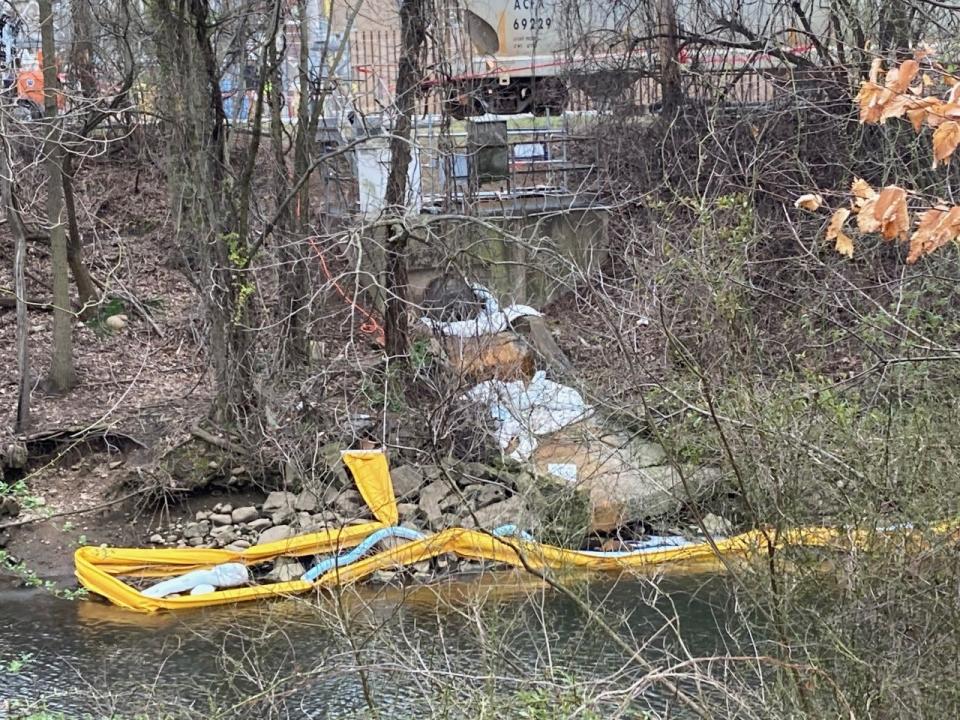What's Trinseo, the company behind the Delaware River chemical spill? Here's what we know
From a nondescript building by a tiny stream, the accidental release of synthetic chemicals led millions of people in Pennsylvania and New Jersey to worry about toxins in their drinking water.
Chemicals released by Trinseo into Otter Creek in Bristol Township are used in dozens of products already in your home, car or truck, though the health effects of exposure to such substances is largely unknown, studies show.
Days after the release of some 8,100 gallons of a latex polymer, details have emerged about the company and Delaware River chemical spill. Based in Ireland, Trinseo declined a request by this news organization for an in-person interview on the accident and tour of its Bristol facility.
The plant is 72 years old. Trinseo has been there since May 2021 with about 110 employees, company officials said.
To prevent future spills, the business said it would take "all available measures" and perform a "root-cause review" of the accident. The exact amount and type of chemicals released is well known to the company, said Gretchen Toner, senior manager for corporate communications at Trinseo.
"Our processes have many continuous measurements, and we know the amount of material that left our process accidentally," Toner said.
For subscribers: Could shots, not pills, better treat drug-addicted inmates and safeguard Bucks County jail?
More: Environmentalists worry Delaware River chemical spill threatens fish and plant life
What was released in the Delaware River chemical spill?
Trinseo’s Bristol plant is part of the company’s PMMA division for the production of colored and translucent plastics. Thousands of companies use PMMAs (polymethyl methacrylate chemicals) in construction materials, cars and trucks, home appliances, and even containers for cosmetics. PMMA chemicals are designed to make objects more resistant to heat, scratches, and ultraviolet rays.
PMMAs might be in your car's dashboard display, microwave oven clock, or the light fixtures throughout the house. You likely interact with products containing PMMAs on a daily basis.
Trinseo promotes it PMMA chemical lines as not containing any BPAs and phthalates, which some have linked to cancer, hormone deficiencies, and other health problems. The company also helps recycle chemicals, turning plastic products back into their initial chemical components for re-use as something else.
On March 24, Trinseo said its Bristol plant accidentally spilled four things ― water, butyl acrylate, ethyl acrylate, and methyle methacrylate that reached the Otter Creek near the Delaware River.
Butyl acrylate is used in glues, paint, fabrics, fuels, and plastics. The chemical is colorless with a fruity odor. Exposure can irritate the eyes, skin, and respiratory system, according to the National Institutes of Health.
Methyl methacrylate is colorless and smells both acrid and fruity, according to the EPA. The chemical is used in airplane parts, cars, furniture and medical devices. According to the EPA, there's not enough evidence to determine whether the chemical is carcinogenic. Some studies suggest “acute exposure” to methyl methacrylate can irritate the eyes, nose, and throat. Long-term exposure could lead to asthma, according to the EPA.
Ethyl acrylate is described by the EPA as a "highly flammable" clear liquid with an acrid smell. The EPA has categorized the chemical as “possibly carcinogenic to humans” due to a lack of data and inconclusive results in earlier studies on the chemical.
Investigations: How drivers are fighting, and winning, automated ticket technology on Bucks County school buses
For subscribers: Preserved Buckingham farm ordered to stop running 'solid waste facility.' Here's why
Trinseo warned investors of hazards and risks
As a publicly traded company, Trinseo files annual reports with the U.S. Security & Exchange Commission. In such reports, corporations commonly warn investors of potential risks such as rising fuel prices, labor shortages and lawsuits that could impact the stock.
In a December 2022 report, Trinseo warned investors of hazards that "could expose employees, customers, the community and others to toxic chemicals." A list of potential hazards and risks included "pipeline and storage tank leaks and ruptures," "failure of mechanical systems, computer systems, process safety and pollution control equipment," and "chemical spills and other discharge or releases of toxic or hazardous substances or gases."
Trinseo's Bristol facility, at 100 Route 413, is barely mentioned in that report as a property leased from the DOW Chemical Company. Once part of DOW Chemical, Trinseo has operated from other DOW industrial parks in the U.S. In 2010, DOW sold that part of its business for $1.6 billion.
From corporate offices in Ireland, Trinseo employs from 3,400 workers, most of them in Africa, Asia, Europe, and the Middle East. Only about 100 people work at Trinseo's Bristol plant, the company said.
On Friday, Trinseo released a statement about the Bristol facility and a spotless record of compliance with environmental regulations. Trinseo took over the Bristol plant in 2021, the company said. No significant violations or issues of noncompliance were ever issued during that time.
"Trinseo PLC would like to take this opportunity to correct the record about the historical environmental performance of the Altuglas LLC facility in Bristol," the company said in a press release. "This in no way minimizes the seriousness of the accidental release that occurred on Friday, March 24.
"We are dismayed by the release and by the knowledge that our community was disrupted as a result," company officials said. "We understand that we will be judged by our performance."

This article originally appeared on Bucks County Courier Times: What is Trinseo ― the company with the Delaware River chemical spill?

